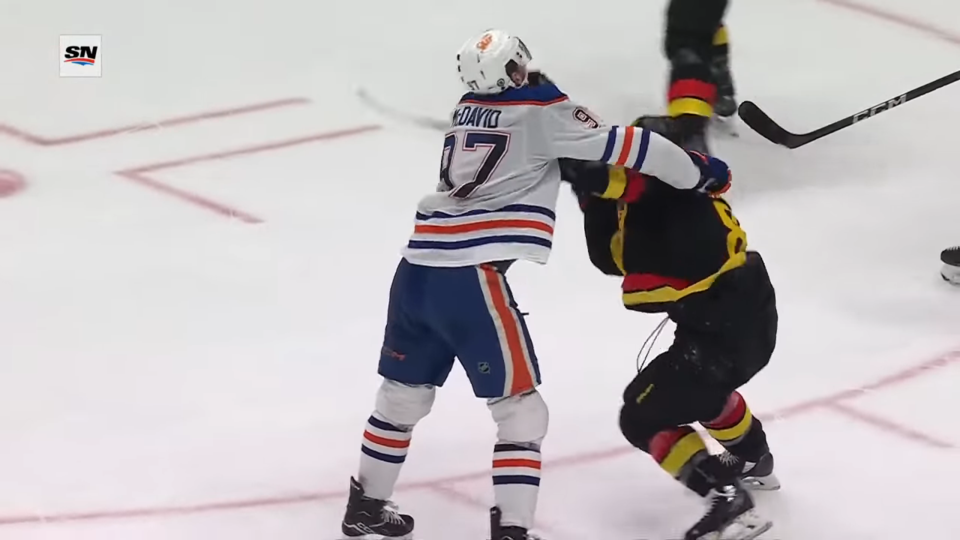Tyler Myers and Connor McDavid are getting the same time for the same crime.
The two NHL-award-winning players received hearings with the NHL's Department of Player Safety (DoPS) on Monday afternoon for their actions at the end of Saturday's game between the Vancouver Canucks and Edmonton Oilers.
McDavid, after being repeatedly held and interfered with by Conor Garland, lashed out with a crosscheck to the side of Garland's head. In the brouhaha that ensued, Tyler Myers did the same to Evan Bouchard, crosschecking Bouchard in the face after the two exchanged a couple of slashes.
What was Myers thinking?
"Not a lot," said Myers after Monday's practice. "Things were getting heated. I'm not ignorant to the fact of how it looks in real time but if you slow it down, I did start lower and, as he started to bring his hands up, it kind of redirected my stick a little higher.
"I know how it looks. I never intended to hit him in the face. I've never crosschecked anyone in the face in my whole career. I was talking to him at the red line after and he seemed to be okay. I don't want to hit a guy in the face like that and it was unfortunate that it ended up that way and I'm glad he's okay."
McDavid, for his part, has not spoken about the incident.
The DoPS gave both Myers and McDavid the same suspension: three games. Shockingly, the DoPS got it right.
Whatever reasons might be given by either player, whether it was unintentional or a frustrated response to being held and impeded, there's no excuse for crosschecking a player in the face. You're responsible for your stick and your actions, so a suspension was the right call.
"With the puck at the half-wall, McDavid turns to face Garland, approaches him, draws back his stick with both hands, and intentionally strikes Garland in the head with force," states the video from the DoPS, later pointing out that McDavid's actions escalated the encounter. In other words, it was not an appropriate response to being held.
In other words, the DoPS highlighted that the crosscheck came away from the puck, was intentional, and was forceful, all of which played into the length of the suspension. Their wording for Myers' suspension was slightly different, pointing out that his incident came after the whistle had already gone.
"Bouchard approaches Myers with one hand on his stick," states the video. "As he does, Myers raises his stick with two hands, draws it back, and delivers a blow that hits Bouchard directly in the face."
The DoPS also disagreed with Myers' assertion that Bouchard redirected his stick upwards: "It is important to note that this is not a case of a stick that is directed toward the body that rides up the opponent. This crosscheck is delivered cleanly to the head of Bouchard...This is an intentional crosscheck by Myers, who raises his stick significantly to initiate this contact."
The key points are that the crosscheck came after the play was blown dead, was intentional and forceful, and came when Myers could not have anticipated Bouchard attacking him in a similar manner, since he only had one hand on his stick.
Still, the two incidents are similar enough that equal suspensions feel like the right call. They're both intentional and forceful crosschecks to the head away from the puck to unsuspecting opponents.
As for the length of suspension, one has to think the timing of the game plays a factor. The crosschecks both happened with 2.3 seconds left on the clock — the game was essentially over. Therefore, their match penalties were not much of a punishment for their actions.
A two-game suspension might have made sense if the crosschecks happened earlier and they had already missed a portion of Saturday's game. Tacking on a third game to make up for the inconsequential match penalty is the right call.
The three-game suspension also removes Myers and McDavid from the rematch between the Canucks and Oilers on Thursday, which could help keep things from boiling over in that game. Or maybe not. There have been calls from Oilers fans for retribution on Garland, who, once again, was holding and interfering with McDavid, not attempting to injure him.
While the NHL's officiating deserves scrutiny in the wake of this incident — they're the ones who allowed the situation to get out of hand in the first place — the DoPS, for once, got this right.



